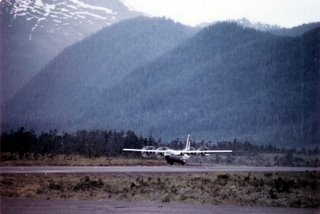Dishonest academics in the National Fisheries Debate

Some of us colmunists on AlaskaReport have written about processor funding of the chief "processor quotas economist" before. Hence the reference to the Darth Vader of Economists.
This Hercules was bringing a load of chum salmon into Petersburg from Kotzebue Sound. They weren't dressed, so the effort wasn't repeated.
A reader resent this communication he had with a Fish and Game employee, who he says is now with NMFS, that makes it prety plain. That is, how Washington State University, the big processors and the Alaska State government worked together to give away vast State and Federal fish resources to a few already rich folk.
My posts to my blog and hence to AlaskaReport have been two days apart lately. It seemed to me this morning that at that rate, there is one day for readers to digest the stuff I put out and one day to do something about it if so inclined. If it doesn't strike you that you should do anything, that's OK. But, if you are pointing and saying "someone should do something," remember, there are three fingers pointing back at you. Enjoy.
Sent: Monday, March 11, 2002 4:35 PM
To: Jeff Hartman
Subject: processor grants to WSU and who knew
Jeff,
Thanks for the response. You wrote: "I just wanted to point out that your communication contains inaccuracies. Did you check your sources carefully before sending it? Dr. Matulich has not concealed the 8 year old WSU gift award from PSPA to which you refer, to our agency and staff. In addition, we have been aware of this information since the grant was provided to WSU."
I have personally heard Dr. Matulich testify at NPFMC and Alaska Board of Fisheries meetings in addition to the National Research Council/National Academy of Science hearing on IFQ's. Dr. Matulich has been asked at these meetings, and I have asked him personally, if there was any processor connection with his research. EVERY single time he answered that he merely had an academic interest in the subject.
I have also asked State of Alaska representatives at these meetings/hearings, and the State get togethers prior to council meetings, if they thought there was processor funding involved. Again, EVERY single answer I received from these State of Alaska representatives was that there was no connection.
Back to your question about checking my sources, a couple of questions come to mind. Since over the course of many years I had repeatedly asked the State and was told, "No, there is no processor funding of Dr. Matulich", why would I check again? I've found no fellow Alaskan fisherman or Alaskan fishermens representative in eight years who was given this knowledge? Should I have assumed I was decieved earlier?
If so, how would I know who to ask this time? Which staff members have known of this and for how long? Putting the onus on me to ask for information from the same sources who said it doesn't exist is a bit twisted. Does the State feel no obligation to give information freely to it's citizens?
I realize there is an "out" for both Dr. Matulich and the State, though I don't belive this will pass the red face test. These contributions were not made directly into Dr. Matulich's bank account, they were laundered through WSU and not made public. This is akin to saying individual candidates do not benefit from soft money contributions since the money gets laundered through a PAC.
You wrote: "If prior grants from industry were an important criteria for selection of University based research, public agencies would be unable to contract much research." You altered my concern to one that is easy to respond to. I agree with you, and, as I wrote originally: "The problem is not that Dr. Matulich conducted research at the request of and funded by industry, it is his attempt to conceal that very fact."
The fact that you knew was not enough. The processor contributions to WSU were kept from those attending meetings where Dr. Matulich presented his work. That the contributions were kept secret through the artifice of saying there was no monetary gain to Dr. Matulich since the payments went to his employer and thus did not need to be disclosed is laughable.
Your reply actually reinforces my point that certain employees of the State of Alaska are making decisions in a vacuum. The State has had knowledge of the processor grants to WSU for 8 years and harvesters were not told. I guess I should say thanks for sparing me knowledge that I obviously cannot handle.
P.S. The secrecy around the grant funding is a minor issue. The main point of my original post was that the design of Dr. Matulich's State funded study guaranteed the result. He only looked at prices, profits and losses of harvesters and processors without checking into the causes of processor losses. All losses can only be attributed to increased harvestor leverage from IFQs.
My example of processors dumping frozen inventory below cost because the IPHC increased the following years quota was probably the single greatest loss the processors incurred during the three year post IFQ study period. Though this loss had nothing to do with harvester leverage or IFQs, it can ONLY be caused by increased harvester bargaining power in the Matulich study. Any policy derived from this study would be a disaster.


<< Home